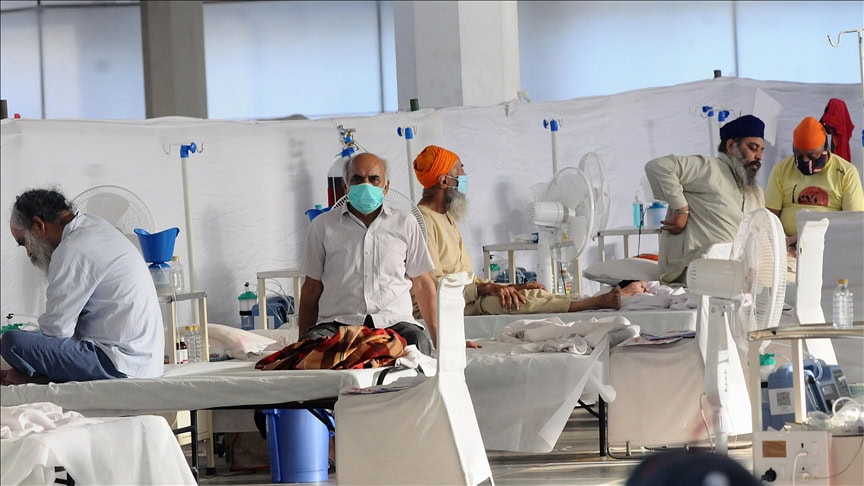Although the National Command and Operation Center (NCOC), Pakistan’s central pandemic response body, claims that the Delta variant now accounts for more than 70% of daily COVID-19 positive cases in major Pakistani cities, experts question this claim, claiming that tracking new variants in Pakistan is difficult due to the lack of genome sequencing technology required to identify a new variant.
The Delta strain was first discovered in India in December 2020, resulting in a widespread pandemic across the country. According to US Center for Disease Control tracker, it quickly spread and is currently recorded in 104 countries.
According to recent research published in The Lancet, although scientists are still attempting to establish how dangerous the Delta variation is, based on hospitalizations in the UK, the variant seems to be more likely to lead to hospitalization and death, especially among unvaccinated individuals.
Data obtained by Arab News from government authorities in Islamabad and the four provinces of Punjab, Sindh, Khyber Pakhtunkhwa, and Balochistan revealed an alarming increase in the number of Delta variant cases across Pakistan.
“What is being reported in media in Karachi, Lahore, it has spread a lot,” a top NCOC official said last week, commenting on Delta variant cases in major Pakistani cities. “It is somewhere around more than 70 percent.”
However, he said that the genome-sequencing tools required to monitor new strains of the virus were presently only available in Islamabad and the southern Sindh province. He said that the center was attempting to get additional kits to give to other provinces:
The Delta strain has been discovered in the Islamabad Capital Territory, according to Dr. Zaeem Zia, the district health officer for Islamabad, but precise numbers were impossible to give.
“We only send a specific number of samples to the National Institute of Health for genome-sequencing, therefore it is difficult for us to give an exact number of how many people in Islamabad are infected with the Delta variant,” Zia told Arab News.
When asked for a number for the ratio of Delta variant cases among daily positive reports in all of the country’s federating units, NIH officials refused.
Provincial administrations, on the other hand, provided Arab News with some preliminary numbers based on samples submitted to the National Institute of Health in Islamabad for examination.
The Delta variant was verified in 56 of 85 samples gathered for genome sequencing from various hospitals in Lahore, Punjab province’s capital, according to the Punjab health authority on July 15.
According to Aziz Ahmed Jamali, secretary of the Public Primary Healthcare Initiative (PPHI) in Balochistan province, 17 of the 21 samples submitted to the NIH for testing in July 2021 were verified to be the Delta strain.
Dr. Ikram Ullah Khan, assistant director-general health in Khyber Pakhtunkhwa province, said the Delta variant was found in 16 of 21 genomes sequenced samples from the region.
According to Abdul Rasheed Channa, a media consultant to Sindh’s chief minister, 66 of 356 samples examined on July 12 were of the Delta variant instances.
The Delta variant currently accounts for 92 percent of COVID-19 cases, according to Professor M. Iqbal Choudhary, head of the International Center for Chemical and Biological Sciences.
Choudhary stated that 83 cases were identified as the Delta variant from a sample of 90 cases tested earlier this month, according to his organization’s Virology Institute.
Many experts, however, doubt the validity of the information given by provincial officials.
Professor Dr. Amir Ali Abbasi, head of the National Center for Bioinformatics at Islamabad’s Quaid-i-Azam University, said there was no reliable method to detect COVID-19 variations in Pakistan since the provinces lacked genome-sequencing equipment.
“Sequencing is a complicated thing and requires a rigorous process to detect COVID-19 variants, and our institutions lack the capacity and expertise to do it,” Abbasi told Arab News. “Scientists collect the data through sequencing, compare it with the data of the whole world and then come to a conclusion about the variants present in a sample.”
According to him, the National Center for Bioinformatics sequenced 150 samples during the first wave in June 2020 and discovered 327 coronavirus variants in Pakistan, which had entered the nation via 28 countries including Oman, the United States, Jordan, and Qatar.
“This took us one and half years,” he said.
“The NCBI lists 472 Delta variants sequences from Asia,” he said, “but none of them are from Pakistan.”
Additional reporting by Naimat Khan in Karachi, Rehmat Mehsud in Peshawar, and Saadullah Akhter in Quetta.










